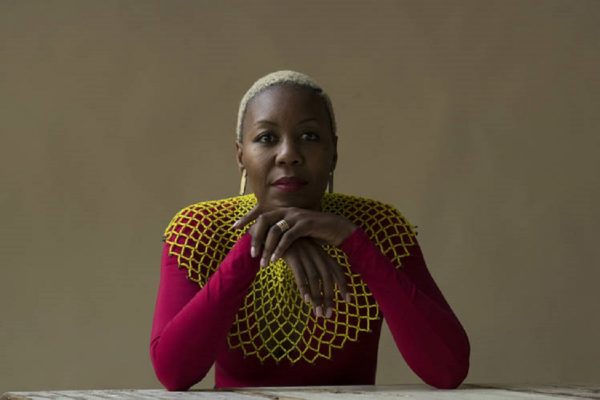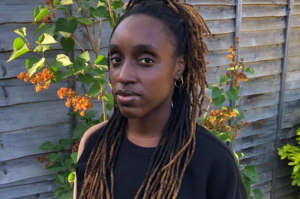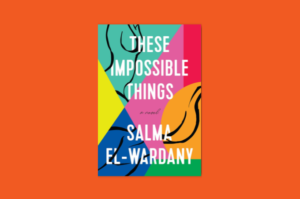
Sisonke Msimang is the author of Always Another Country: A Memoir of Exile and Home (2017) and The Resurrection of Winnie Mandela (2018). She has written for the Daily Maverick, The New York Times, The Washington Post, The Guardian, and Al Jazeera. She has held fellowships at Yale University, the Aspen Institute, and the University of the Witswatersrand in Johannesburg. She currently lives on planes, navigating the distance between South Africa and Australia.
Following her win of the inaugural Brittle Paper Award for Essays & Think Pieces in 2017, for her essay, “All Your Faves Are Problematic: A Brief History of Chimamanda Ngozi Adichie, Stanning, and the Trap of #BlackGirlMagic,” published in Africa Is a Country, she was in conversation with Gaamangwe Joy Mogami, founder and editor of the Botswana-based interview magazine Africa in Dialogue. This conversation is taken from Africa in Dialogue‘s e-book of conversations with the 2017 winners of the Brittle Paper Awards, including JK Anowe, Hawa Jande Golakai, Chibuihe Achimba, and Megan Ross.
______________________________________________________________________
Gaamangwe Joy Mogami:
Sisonke, congratulations on winning Brittle Paper’s inaugural Essay Award! How was your experience when you won?
Sisonke Msimang:
It was wonderful especially because I didn’t know that there was going to be an award when I wrote the piece for Africa Is a Country. When the shortlist was announced, I looked at the other people in the shortlist and I thought, ‘There is no way that I’m going to win. That’s nice for them to include me!’ and then I won and I was as surprised as everyone. It was amazing.
Gaamangwe Joy Mogami:
That is great. Your essay was illuminating. Let’s time-travel to when you wrote it. I am sure it was inspired by events happening that time period but I am interested in what was the impetus of the essay?
Sisonke Msimang:
For most of us who are interested in writing, particularly people who are doing interesting and intellectual work in our continent, Chimamanda is an important figure. I have been reading and thinking about her for a long time. I was also thinking about this whole idea of #blackgirlmagic and #blackgirlexcellence, and how burdensome it came be. Chimamanda in so many ways embodies the idea of a black woman who has taken up space in powerful and
important ways. She is someone who is admired by many but also someone who bears the burden of that admiration because in some ways she is the only one of that stature. It’s a very large burden to carry. So I combined the two ideas because I have been suspicious and critical of what the term “Black Girl Magic” might actually mean in relation to the stereotype of the Strong Black Woman.
Black women are always expected to achieve. We are expected to take and take and take and always be strong and show our strengths. I think that hides a lot of our vulnerabilities and someway this feeds into the idea of “Black Girl Magic.”
Gaamangwe Joy Mogami:
Yes, and when the criticism comes, it comes in an exaggerated and harsh manner especially for black women. Chimamanda has experienced both the celebration and the criticism. It’s at a point where everything that she says in under scrutiny. It’s really harmful. I found it powerful that you paired Chimamanda with the #blackgirlmagic. I realized, while reading the essay, that I was not really using the hashtag consciously, and so I was not cognitively aware of what I was implying with it, let alone what the politics around it are. I have pictures where I am standing there doing nothing related to excellence whatsoever but #blackgirlmagic it. I had to check myself out on that.
Sisonke Msimang:
That’s right. What I try to do with my writing and criticism is to point something out so that we are conscious and thinking of it. However, I am not of the school of thought that says [that] because we have a critique, it means we must stop. I love #blackgirlmagic. I am critical of something so that I can use it in ways that works best for me. For example, people read a cigarette pack and know what’s in it and they can still choose to smoke that cigarette and I am not going to hate them, right? So I feel like there is a lot in criticism especially these days where everyone is woke and conscious about “being
the way they are suppose to be” and I really don’t want my intellectual observations to stop people from being who they are. I want it to be productive so that people can reflect and think about it and obviously use that information the way they feel they need to. I did not write the essay to judge but rather I was saying it is important to think about things. If you want to use the hashtag, have that consciousness and you go, girl!
Gaamangwe Joy Mogami:
I agree. I definitely found reading your essay, learning about the origin of #blackgirlmagic and engaging with the nuances of it, empowering. I now use it with intention. I also think it’s important to look at the meanings and duality of things and make decisions from there. In the essay you wrote:
There are many forces arrayed against the very people #blackgirlmagic was conjured to protect and defend. Perhaps then, it is time to accept that creating new possibilities doesn’t happen magically. The work of imagining new futures and shaping alternate trajectories does not belong to a few glammed up spokespersons.
That second line was interesting for me because I would have thought creating new possibilities happens magically.
Sisonke Msimang:
Here I meant that one of the problems of the idea of magic is that it’s linked to this idea of strength. Somehow, genetically, black women are strong. We just emerge in this world with attitude and this ability to take more and more work. And if you believe that, you overestimate the quality and effort it takes for achievement to happen. And so I don’t want us to unwittingly buy into ideas about us. It’s like different parts of the coin. That on the one hand we are strong like slaves and we can take more whipping, more lashings,
more, more and more. And on the other hand, we are made that way. We are built that way.
So the black woman who achieves becomes; that’s just how they are. That’s what they do. Rather: just like anybody else, just like a white man who works hard to build his empire, so too has Serena Williams worked hard to build her empire, so too has Michelle Obama. There is nothing innate that’s magical that makes us do well. Just like there is nothing innate that makes us do bad. And that’s the stuff that stereotypes are made of, right? And just because it’s a positive one, it doesn’t mean it’s not damaging to us. That’s what I meant on this idea. Why do we call it magic? We call it magic
because it just seems like we are naturally like that. Yet we work for it.
Gaamangwe Joy Mogami:
So it’s a sort of a bypassing. It’s an empowering word but it can also bypass the work that women actually do.
Sisonke Msimang:
Yes. The nice side of it: “Look how amazing they are.” And the dark side of it: “Look how much they can take.”
Gaamangwe Joy Mogami:
Yes. We are having this conversation on how when a woman shares
their experience with violence, especially domestic violence, and everyone says, “Wow, you are so strong.” The first instinct is to celebrate how the black woman has endured the pain and the violence rather than ask why that had to happen in the first place.
Sisonke Msimang:
That’s the same concept. Look how strong she is rather than why was it happening.
Gaamangwe Joy Mogami:
On the other side, everything that women go through is made to be this magical thing. Oh, you are a mother? That is so divine that you went through that experience. And it is divine but it can be traumatizing. And that’s pretty much the response to every aspect of our life.
Sisonke Msimang:
Yes, nobody wants to tell the truth about the pain. I talked about this in my book. I talk about the experience of becoming a mother for the first time and realizing how it fundamentally changes your life and wondering why nobody ever told me.
Gaamangwe Joy Mogami:
Because we are made to feel shame when we say, “Wow, this is actually terrible,” or, “Actually, I worked hard for this.” Everyone expects it to be easy and so women keep that part of the narrative to themselves.
Congratulations on publishing your book! How has the experience been like so far?
Sisonke Msimang:
It’s been a great journey. It was hard to write because with the first book its intimidating because you don’t know if you can finish it and how long it’s going to take. Everything feels new. I have been writing essays and articles for a while but a book felt like a very different beast. But then having it published, letting go and realizing that you did the best you could and that it’s out there in the world—that is so important.
I’ve just been so grateful with the fact that anyone is reading it. Let alone the fact that the commentaries have been so positive and that women, Africans, resonate with a lot of the experiences in the book. That’s been really, really humbling, amazing, and beyond what I have ever thought.
Gaamangwe Joy Mogami:
That’s amazing! That’s every writer’s dream. I am happy for you. Thank you for joining me here, Sisonke.
_______________________________________________________________________
Download: AFRICA IN DIALOGUE INTERVIEWS THE 2017 BRITTLE PAPER AWARD WINNERS









COMMENTS -
Reader Interactions